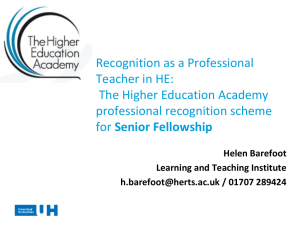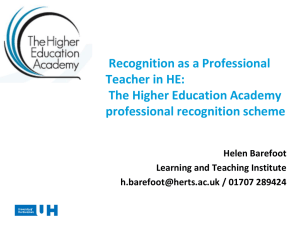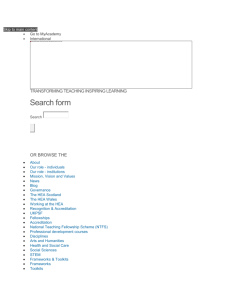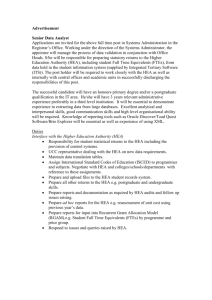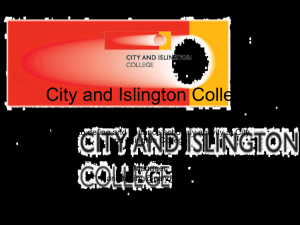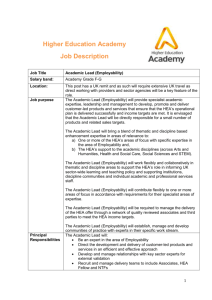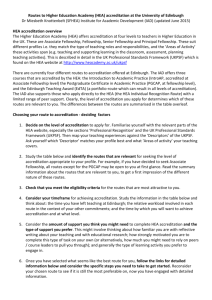HEA`s National Accreditation Scheme
advertisement
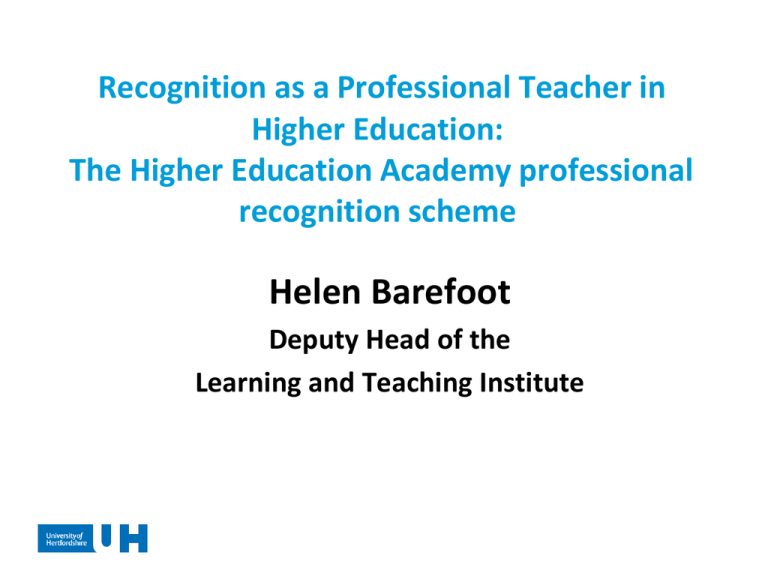
Recognition as a Professional Teacher in Higher Education: The Higher Education Academy professional recognition scheme Helen Barefoot Deputy Head of the Learning and Teaching Institute Workshop Outcomes On completion of this workshop participants should have: • considered the importance of being a ‘dual professional’ • had the opportunity to comment on key issues of interest and concern • had the opportunity to consider and discuss the HEA recognition scheme • had the opportunity to begin to draft one’s own submission. UH’s view “ At UH we consider our academic staff to be dual professionals, that is professional teachers in HE and professionals in their own discipline. As ‘dual professionals’ all academic staff should engage in continuous professional development as relevant and appropriate to their learning and teaching role. UH supports the national professional recognition scheme of the HEA and views it as an important marker of learning and teaching professionalism.” Continuous Professional Development (CPD) • Dual professionals • Most academics undertake a considerable amount of CPD • CPD may be an obligatory part of keeping up professional accreditation • Professional teachers - CPD is often unplanned/informal UK Professional Standards Framework (UK PSF) Standard descriptors 1. Demonstrates an understanding of the student learning experience through engagement with at least 2 of the 6 areas of activity, appropriate core knowledge and professional values; the ability to engage in practices related to those areas of activity; the ability to incorporate research, scholarship and/or professional practice into those activities. UK Professional Standards Framework (UK PSF) Standard descriptors 2. Demonstrates an understanding of the student learning experience through engagement with all areas of activity, core knowledge and professional values; the ability to engage in practices related to all areas of activity; the ability to incorporate research, scholarship and/or professional practice into those activities. UK Professional Standards Framework (UK PSF) Standard descriptors 3. Supports and promotes student learning in all areas of activity,core knowledge and professional values through mentoring and leading individuals and/or teams; incorporates research, scholarship and/or professional practice into those activities The Higher Education Academy “Our mission is to help institutions, discipline groups, and all staff to provide the best possible learning experience for their students.” HEA Professional Recognition Scheme The scheme has been designed to support the implementation of the Professional Standards Framework 3 categories of professional recognition: 1. Associate of the Higher Education Academy (AHEA) 2. Fellow of the Higher Education Academy (FHEA) 3. Senior Fellow of the Higher Education Academy (SFHEA) Professional Accreditation Benefits • Be recognised for the valuable professional work you do and to celebrate this • Valuable portable asset recognised across the sector • Might be critical for promotion/career progression • Help to keep up to date with latest developments in learning and teaching (CPD events, networking) • You can become involved in shaping national policy through work with the HEA HEA Professional Recognition Scheme Recognition Scheme Accredited Programme Associate x x Fellow x x Senior Fellow x Collaborative agreement x NFTS individual award x Areas of Activity 1.Design and planning of Learning activities &/or programmes of study. 2.Teaching and/or supporting student learning. 3.Assessment and giving feedback to learners. 4.Developing effective environments and student support and guidance. 5.Integration of scholarship ,research and professional activities with teaching and supporting learning. 6. Evaluation of practice and continuing professional development. CK1 CK2 CK3 CK4 CK5 CK6 V 1 V 2 V 3 V 4 V 5 HEA’s National Accreditation Scheme Areas of activity 1. Design and planning of learning activities and/or programmes of study 2. Teaching and/or supporting student learning 3. Assessment and giving feedback to learners 4. Developing effective environments and student support and guidance 5. Integration of scholarship, research and professional activities with teaching and supporting learning 6. Evaluation of practice and continuing professional development HEA’s National Accreditation Scheme Core knowledge (knowledge and understanding of) 1. The subject material 2. Appropriate methods for teaching and learning in the subject area and at the level of the academic programme 3. How students learn, both generally and in the subject 4. The use of appropriate learning technologies 5. Methods for evaluating the effectiveness of teaching 6. The implications of quality assurance and enhancement for professional practice HEA’s National Accreditation Scheme Professional values 1. Respect for individual learners 2. Commitment to incorporating the process and outcomes of relevant research, scholarship and/or professional practice 3. Commitment to the development of learning communities 4. Commitment to encouraging participation in higher education, acknowledging diversity and promoting equality of opportunity 5. Commitment to continuing professional development and evaluation of their own practice Application process Detailed information on HEA website Step 1. Complete application form Step 2. Identify 2 appropriate referees Step 3. Return form to HEA with the 2 references Step 4. Normally notified within 2 weeks of receipt. Step 5. Panel of Accreditors assess application normally within 12 weeks Step 6. If accepted notified and have to send recognition fee £50.00 ( nb at present no annual renewal fees) Information to aid application • • • • • • • • • CV Appraisal forms (Peer Observation forms + SFQ data) List of responsibilities Programme reviews/validations/curriculum development CPD activities Funding applications/awards Pedagogic research/evaluations Professional and other organisations you are involved with External examiner work Key words in the process- reflective accounts!! “Please give reasons for your choice of activities and techniques and how they relate to developing the learners’ understanding of the subject. Please explain how you know that your work is effective and how you try and improve it. We expect our core knowledge and values to underpin the practice of Associates or Fellows. Please provide examples , where appropriate, of ways in which this underpinning is apparent.”HEA HEA’s National Accreditation Scheme Activity 1.Brainstorming ideas in pairs to fill in the sections 2.Working individually on sections 3. Plenary to share ideas HEA’s National Accreditation Scheme Criteria to judge your progress against • Areas of Activity 1-6 (Associates: any one of 1 to 4 plus 5 but Fellows need all 6) • Core Knowledge 1-6 • Professional values 1-5 Academic Staff Development and support (provided by LTI) • Continuous Professional Academic Development programme - CPAD: – New Staff Route HEA accredited (PgCert HEA Fellow) – Experienced Staff may attend any modules, e.g. student support and guidance, blended learning • Faculty/School/individual support and liaison • General L&T workshops – e.g. on Assessment, Internationalising the curriculum • BLU workshops • Innovation, development and dissemination of good practice • Staff Educational Research and Scholarship Network (ERSN) Some useful web-sites Higher Education Academy (HEA) http://www.heacademy.ac.uk/ HEA Subject Centre Network ( find on the HEA home page) eg http://www.heacademy.ac.uk/physsci/ http://www.engsc.ac.uk/ Quality Assurance Agency (QAA) http://www.qaa.ac.uk/ (go to Academic Infrastructure to find your disciplines Benchmark Statement) Interesting one for LT&A resources http://www.learningandteaching.info/learning/about.htm
